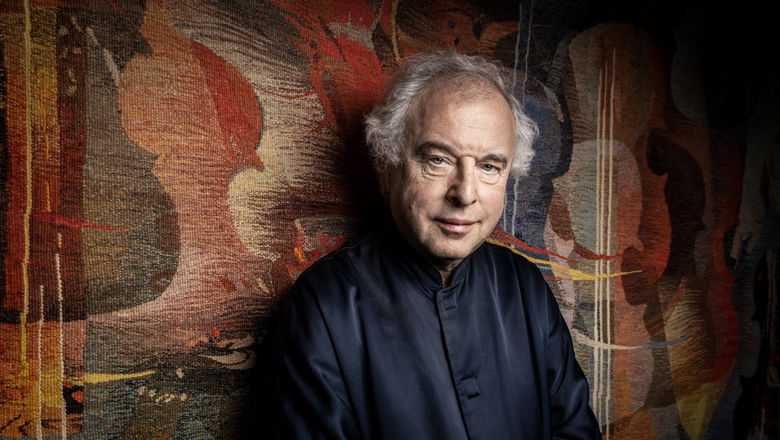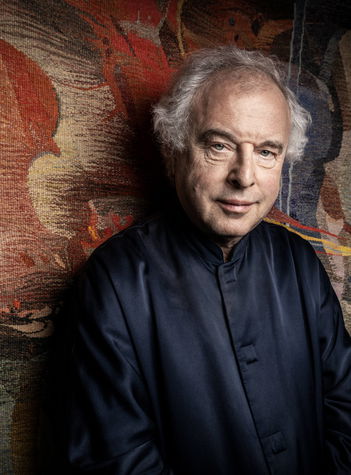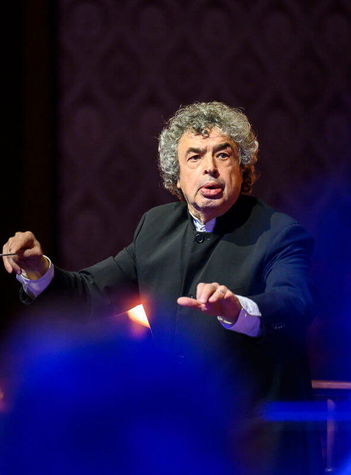1 / 6
Czech Philharmonic • András Schiff
Subscription Series A begins with Antonín Dvořák’s most famous concert overture and symphony and with his only piano concerto. All of this is a foreshadowing of the Year of Czech Music and the Czech Philharmonic’s “Dvořák Festival”, which will take place during the season at the Rudofinum and on tours.
Programme
Antonín Dvořák
Carnival Overture, Op. 92 (10')
Antonín Dvořák
Piano Concerto in G minor, Op. 33 (36')
— Intermission —
Antonín Dvořák
Symphony No. 9 in E minor, Op. 95 “From the New World” (42')
Performers
András Schiff piano
Semyon Bychkov conductor
Czech Philharmonic

The sale of individual tickets for subscription concerts (orchestral, chamber, educational) will begin on 2 June 2025 at 10 a.m.
Individual tickets for all public dress rehearsals will go on sale on 10 September 2025 at 10 a.m.
Customer Service of Czech Philharmonic
Tel.: +420 227 059 227
E-mail: info@czechphilharmonic.cz
Customer service is available on weekdays from 9.00 am to 6.00 pm.
Performers
András Schiff piano, conductor

Sir András Schiff is world-renowned as pianist, conductor, pedagogue and lecturer. He brings masterful and intellectual insights to his performances which have inspired audiences and critics alike. Born in Budapest, Hungary, in 1953, Sir András studied piano at the Liszt Ferenc Academy with Pál Kadosa, György Kurtág, and Ferenc Rados; and in London with George Malcom.
He has performed cycles of complete Beethoven sonatas as well as projects including the complete works of J. S. Bach, Haydn, Schubert and Bartók which constitute an important part of his work. Having collaborated with the world’s leading orchestras and conductors, he now focuses primarily on solo recital, play-conducting appearances and exclusive conducting projects. His Bach has become an annual highlight at the BBC Proms and he regularly performs at the Verbier, Salzburg and Baden-Baden Festivals as well as Wigmore Hall. In April 2023 performed 9 concerts as Artist-in-Residence of the New York Philharmonic.
Vicenza is home to Cappella Andrea Barca – his own chamber orchestra consisting of international soloists, chamber musicians and friends founded in 1999. Together they have appeared at Carnegie Hall, Lucerne Festival and Salzburg Mozartwoche, while forthcoming projects include a tour of Asia and a cycle of Bach’s keyboard concertos in Europe. He currently curates a festival in Vicenza at the Teatro Olimpico.
Sir András enjoys close relationships with the Chamber Orchestra of Europe, the Budapest Festival Orchestra, and the Orchestra of the Age of Enlightenment. In 2018 he accepted the role of Associated Artist with the OAE, complementing his interest in performing on period keyboard instruments.
With a prolific discography, he established an exclusive relationship in 1997 with Producer Manfred Eicher and ECM New Series. Highlights have included the complete Beethoven Piano Sonatas recorded live from Zurich, solo recitals of Schubert, Schumann and Janáček as well as J. S. Bach’s Partitas, Goldberg Variations, and Well-Tempered Clavier. His most recent discs were the two Brahms Concerti with the Orchestra of the Age of Enlightenment on period instruments in June 2021.
He continues to support new talent, primarily through his “Building Bridges” series which gives performance opportunities to promising young artists. He also teaches at the Barenboim-Said and Kronberg academies and gives frequent lectures and masterclasses. In 2017 his book “Music Comes from Silence,” essays and conversations with Martin Meyer, was published by Bärenreiter and Henschel.
Sir András Schiff’s many honors include the International Mozarteum Foundation’s Golden Medal (2012), Germany’s Great Cross of Merit with Star (2012), the Royal Philharmonic Society’s Gold Medal (2013), a Knighthood for Services to Music (2014) and a Doctorate from the Royal College of Music (2018). He was awarded the Jean Gimbel Lane Prize in Piano Performance in 2021 from The Henry and Leigh Bienen School of Music at Northwestern University.
Semyon Bychkov conductor

In addition to conducting at Prague’s Rudolfinum, Semyon Bychkov and the Czech Philharmonic in the 2023/2024 season, took the all Dvořák programmes to Korea and across Japan with three concerts at Tokyo’s famed Suntory Hall. In spring, an extensive European tour took the programmes to Spain, Austria, Germany, Belgium, and France and, at the end of year 2024, the Year of Czech Music culminated with three concerts at Carnegie Hall in New York.
Among the significant joint achievements of Semyon Bychkov and the Czech Philharmonic is the release of a 7-CD box set devoted to Tchaikovsky’s symphonic repertoire and a series of international residencies. In 2024, Semjon Byčkov with the Czech Philharmonic concentrated on recording Czech music – a CD was released with Bedřich Smetanaʼs My Homeland and Antonín Dvořákʼs last three symphonies and ouvertures.
Bychkovʼs repertoire spans four centuries. His highly anticipated performances are a unique combination of innate musicality and rigorous Russian pedagogy. In addition to guest engagements with the world’s major orchestras and opera houses, Bychkov holds honorary titles with the BBC Symphony Orchestra – with whom he appears annually at the BBC Proms – and the Royal Academy of Music, who awarded him an Honorary Doctorate in July 2022. Bychkov was named “Conductor of the Year” by the International Opera Awards in 2015 and, by Musical America in 2022.
Bychkov began recording in 1986 and released discs with the Berlin Philharmonic, Bavarian Radio, Royal Concertgebouw, Philharmonia Orchestra and London Philharmonic for Philips. Subsequently a series of benchmark recordings with WDR Symphony Orchestra Cologne featured Brahms, Mahler, Rachmaninov, Shostakovich, Strauss, Verdi, Glanert and Höller. Bychkov’s 1993 recording of Tchaikovsky’s Eugene Onegin with the Orchestre de Paris continues to win awards, most recently the Gramophone Collection 2021; Wagner’s Lohengrin was BBC Music Magazine’s Record of the Year (2010); and Schmidt’s Symphony No. 2 with the Vienna Philharmonic was BBC Music Magazine’s Record of the Month (2018).
Semyon Bychkov has one foot firmly in the culture of the East and the other in the West. Born in St Petersburg in 1952, he studied at the Leningrad Conservatory with the legendary Ilya Musin. Denied his prize of conducting the Leningrad Philharmonic, Bychkov emigrated to the United States in 1975 and, has lived in Europe since the mid-1980’s. In 1989, the same year he was named Music Director of the Orchestre de Paris, Bychkov returned to the former Soviet Union as the St Petersburg Philharmonic’s Principal Guest Conductor. He was appointed Chief Conductor of the WDR Symphony Orchestra (1997) and Chief Conductor of Dresden Semperoper (1998).
Compositions
Antonín Dvořák
Carnival Overture, Op. 92
“Whatever we have in Czech history that is truly great has grown from the bottom up!” This sentence by the famous Czech author Jan Neruda tells us a great deal about the history of the Czech nation and its great figures. It certainly applies unreservedly to Antonín Dvořák, whose growing artistry took him from a little village to the world’s greatest metropolises.
When Neruda wrote these words in 1884, he was 50 years old. And what was Antonín Dvořák doing in 1891 at age 50? He was a famous, sought-after composer, an artist whose popularity had long since crossed the borders of Austria-Hungary and spread all over Europe. It was in the year of his 50th birthday that he was offered the directorship of the National Conservatory of Music in New York. He considered the matter very carefully, consulting with many of the people who were close to him. For example, he wrote to his friend Alois Göbl in June 1891: “I’m supposed to go to America for two years! […] Should I accept the offer? Or not? Send me word.” Dvořák had never been very fond of celebrations, so it is no surprise that in early September he refused to take part in celebrations in Prague for his 50th birthday because he was spending time with his family at his beloved summer home in Vysoká, where he went to rest and to compose. Four days after his birthday (12 September 1891), he finished orchestrating Carnival Overture, Op. 92, the second work in a cycle of three concert overtures that are programmatic in character. We do not have a concrete programme from the composer, but he clearly realised something here that no one would have expected from him in the realm of symphonic music. Two years earlier, he had already gone down this path in chamber music with his Poetic Tone Pictures, Op. 85, thirteen pieces for solo piano, about which he jokingly commented: “I’m not just an absolute musician, but also a poet.” Dvořák had originally conceived his triptych of concert overtures depicting three aspects of human life as a single whole with the title “Nature, Life, and Love”. All three overtures are also carefully motivically interconnected. Ultimately, however, the composer told his publisher Simrock that his overtures “each can also be played separately”, and he gave them the opus numbers and titles In Nature’s Realm, Op. 91, Carnival Overture, Op. 92, and Othello, Op. 93. The first performance of all three overtures took place on 28 April 1892 at the Rudolfinum in Prague at the composer’s farewell concert before his departure for America, with Dvořák himself conducting the orchestra of the National Theatre. Dvořák also conducted their second performance, this time across the ocean on 21 October 1892 at New York’s Carnegie Hall.
Antonín Dvořák
Piano Concerto in G minor, Op. 33, B63
Dvořák was already a composer of genius by 1876, when he wrote his Piano Concerto in G minor, Op. 33, but he was basically known only to the Prague public. At the time, he had to earn a very modest living as an organist and by giving piano lessons privately. In those days, the pianist Karel Slavkovský was devoting considerable attention to music by Czech composers. On 24 March 1878, it was he who played was the first to play the solo part of Dvořák’s new work in the hall at Prague’s Žofín Palace. A second performance, again in Prague and with the same pianists, took place two years later. At that time, shortly after the extraordinary success of Dvořák’s Moravian Duets and of the Slavonic Dances in Germany, he was receiving offers from important publishers. One of them, Julius Hainauer from Breslau, published the concerto in 1883. Before publication, Dvořák made major revisions to the score, giving the work its ideally polished sound. His concerto was ahead of its time in many ways, and that had negative consequences. Some music critics (although a small minority) saw the work’s departures from the usual as weaknesses, while others were blinded by their aversion to Czech patriotism, an entirely irrelevant objection in the case of Dvořák. Despite such voices, the composer maintained a very detached perspective. After an otherwise successful concert in Berlin in 1884, Dvořák wrote to the piano virtuoso Anna Grosser: “All this criticism overflowing with ridicule, hatred, and bile (more like an execution) provides me with plenty of amusement and entertainment. Things keep getting crazier, but those gentlemen in Berlin still will not stop me from taking flight!”
The critics did not keep the composer from taking flight, but his Piano Concerto remained grounded to some extent. The concerto continued to be played over the following years, but notably less often than other great works by Dvořák. An important chapter in the performance history of the concerto in the 20th century belongs to an arrangement of the solo part made by the Prague piano virtuoso and teacher Vilém Kurz 15 years after Dvořák’s death. Several of his pupils and other pianists played the concerto in that form even long after such arrangements had ceased to be fashionable, when, to the contrary, there were increasing efforts towards the most faithful possible interpretations of composers’ intentions. The soloist for today’s concert, András Schiff, has clear reasons for playing Dvořák’s own version. More and more pianists have begun doing so in recent decades, but the work is still performed less often overall than other concertos. The key to an explanation may be the words of the phenomenal pianist Sviatoslav Richter, who only played Dvořák’s own version. Richter certainly did not suffer from technical limitations, but he always “merely” had to get to the heart of a work and understand it. In November 1977, he wrote in his diary: “I recall how long it took me to learn this [Dvořák’s] concerto (nearly three years), while I learned Bartók’s Second Piano Concerto in just two months without having any special difficulties.” This may be another reason why it is hard to find another work like Dvořák’s Piano Concerto: brilliant yet seldom heard.
Antonín Dvořák
Symphony No. 9 in E minor, Op. 95, “From the New World”
Dvořák’s prestigious invitation to New York did not come out of nowhere. For years, his music had already been familiar in the United States, and American newspapers had been writing about his successes in Europe as a composer and conductor. Above all, however, for America Dvořák was iconic as a national composer. “Americans expect great things from me, and above all, supposedly, that I will show them the way to the promised land and to the realm of new, independent art, in short, how to create the music of a nation!! […] Certainly, this is an equally great and beautiful task for me, and I hope I shall have the good fortune to succeed with God’s help. There is more than enough material here,” wrote the composer to his friend Josef Hlávek after arriving in America. Dvořák did, in fact, delve into America’s musical material with great interest, as is revealed in an interview for the New York Herald: “Since I have been in this country I have been deeply interested in the national music of the negroes and the Indians. […] I intend to do all in my power to call attention to this splendid treasure of melody which you have.” Dvořák did not borrow the melodies, however. He created his own melodies using many of the characteristic features of folk songs that he combined with the essence of American folklore. In addition, the motifs from the new Symphony in E minor, Op. 95, “From the New World”, did not come into the world instantly in the form in which we now know them. This is documented by the composer’s sketches, in which the now famous themes appear still with many deviations from the final version. It is clear that during the compositional process, Dvořák was giving ever deeper expression to the “American spirit” that he wanted the music to embody, adding syncopations including a special rhythm known as the “Scotch snap”, highlighting the pentatonic scale etc. However, his new symphony was by no means an attempt to do everything differently from his previous symphonies. As he was finishing the score, he brought this up in a letter to his friend Göbl: “I’m just now finishing my Symphony in E minor, which will be strikingly different from my earlier ones, mostly in terms of melodic, harmonic, and rhythmic figures—just my orchestration has not changed, something in which I probably will not advance any further, nor do I wish to, and I have my reasons.”
The composer also mentioned the work’s tempestuous reception at the premiere at New York’s Carnegie Hall in December 1893 (Anton Seidl conducted the New York Philharmonic) in a letter to his publisher Fritz Simrock in Berlin: “The symphony’s success on December 15th and 16th was magnificent; the newspapers say that no composer has ever before achieved such a triumph. I was seated in a box, the hall was occupied by New York’s most elite public, and the people applauded so much that I had to wave from my box like a king to show my gratitude! Like Mascagni in Vienna (don’t laugh!). You know that I prefer to try to avoid such ovations, but I had to do this and show myself.” The composer did not inscribe the title “From the New World” on the score’s title page until a few months after finishing the work; it was on the very day that he handed the score over to the conductor for rehearsals. The title of the first work he had written in America gave rise to a great deal of comment in newspaper articles. Having read them, the composer supposedly remarked with a smile: “Well, it seems I have confused their minds a bit.”